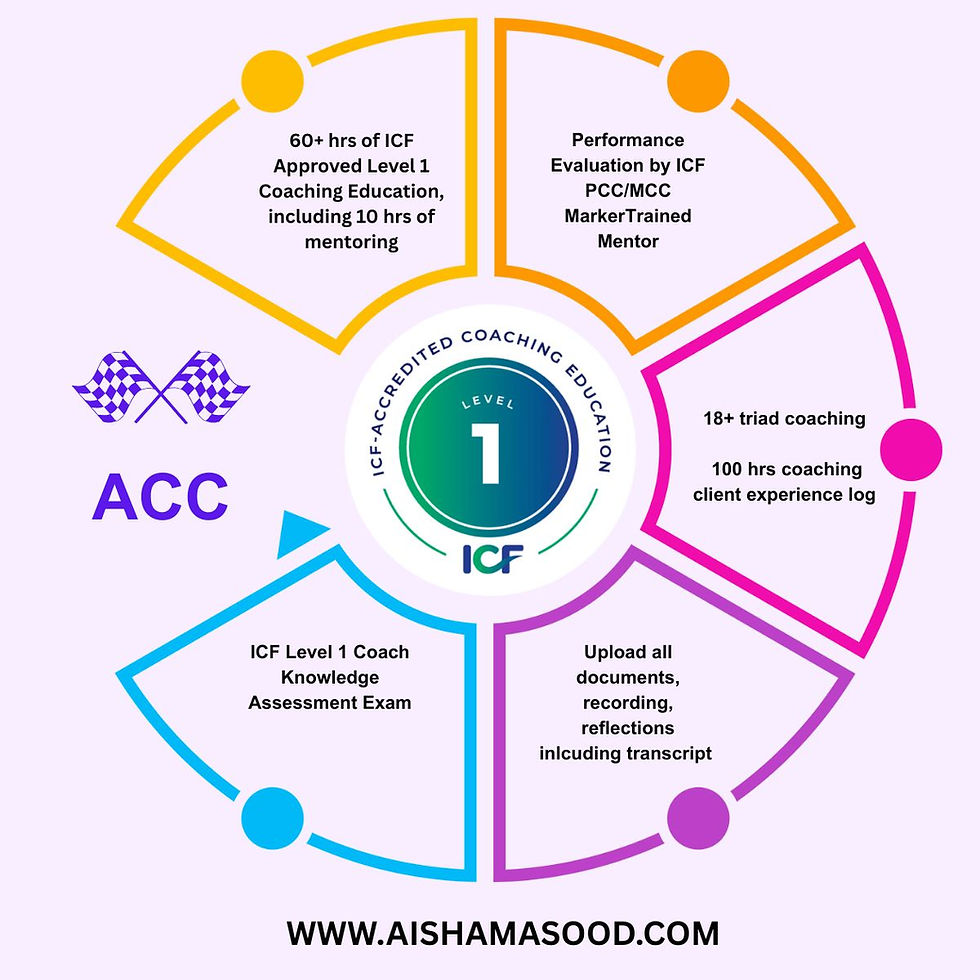Coaching at the Core: Understanding the ICF Competencies
- Ayesha Masood
- Sep 18, 2025
- 3 min read

“And you? When will you begin that long journey into yourself?” – Rumi
When I started my coaching journey in 2018, I thought coaching was about asking clever questions and inspiring people with my best wisdom. (Spoiler: it’s not.)
The more I practiced, the more I realized: great coaching is built on something far deeper—the ICF Core Competencies.
These aren’t just rules to memorize for an exam. They’re the living, breathing backbone of coaching. When you practice them, your coaching conversations shift from “nice chats” into powerful moments of transformation.
Let’s break them down—simply, with a bit of humor, and with the depth I’ve discovered both in my classroom and in real coaching sessions.
1. Foundation
Demonstrates Ethical Practice
Embodies a Coaching Mindset
Ethics isn’t just paperwork. It’s knowing when to coach, when to refer, and when to stop talking. As I tell my Coaches in Training “If you ever wonder whether something crosses a line… it probably does.”
And the coaching mindset? That’s about curiosity, self-reflection, and remembering you’re a learner too. I’ve been coaching since 2018, and still, before every session, I take a breath and remind myself: This space is about them, not me.
2. Co-Creating the Relationship
Establishes and Maintains Agreements
Cultivates Trust and Safety
Maintains Presence
This is where the magic begins. Coaching is not a one-way street; it’s a partnership. Agreements set the “rules of the road”—so no one mistakes coaching for therapy or mentoring.
Cultivating trust? That takes time. I’ve had clients who only opened up in session 5 or 6. Presence means being so focused on your client that even if your phone buzzes, you don’t hear it (and if you do, you definitely don’t check it).
3. Communicating Effectively
Listens Actively
Evokes Awareness
Listening is not nodding while waiting for your turn to talk. Real listening is hearing what’s not being said. In one of my classes, I often tell new coaches: “If your client says they’re fine three times in a row, they’re probably not fine.”
Evoking awareness is when your question lands so powerfully that your client pauses and says, “I’ve never thought of it that way before.” That’s when you know you’ve struck coaching gold.
4. Cultivating Learning and Growth
Facilitates Client Growth
This is where everything comes together. Coaching is not about “aha moments” that vanish after the call—it’s about helping clients turn insights into action. I often remind my students: “If nothing changes after the session, it was just a good conversation, not coaching.”
What Coaching Is Not (Quick Reality Check)
❌ Not therapy—you don’t need to dive into childhood traumas.
❌ Not motivational speeches—no stage lights required.
❌ Not advice-giving—your job isn’t to be the “guru.”
Instead, coaching is about creating a safe, powerful space where clients unlock their own answers.
My Honest Reflection
When I first taught these competencies, my students would ask: “Do I have to remember all eight during a session?” The truth is—no. With practice, they sink into your bones. You’ll find yourself naturally listening deeper, staying present, and asking sharper questions.
Even now, after years of coaching and training others, I catch myself applying these competencies in daily life—whether with my team, my kids, or even during those “kitchen table debates” at home. Coaching isn’t just something you do. It becomes part of who you are.
In summary: The ICF Core Competencies are not a checklist. They’re a way of being. They remind us that coaching isn’t about showing off how smart we are—it’s about creating transformation by being present, curious, and deeply human.
In the next article, I’ll share practical tips on how to practice these competencies without sounding scripted or robotic—because let’s face it, no one wants to sound like a coaching manual.



Comments